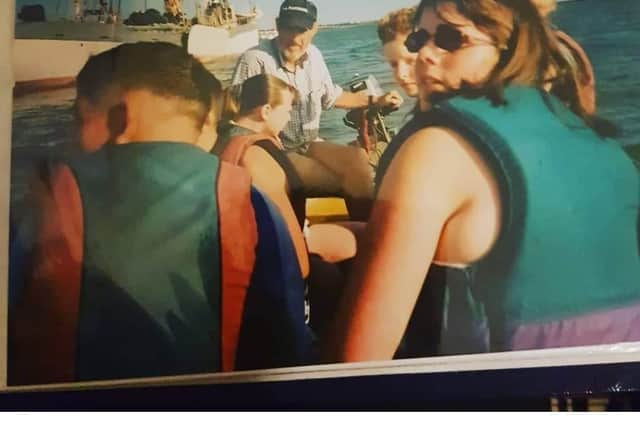Ex-Lancashire youth worker hails power of sector as report recognises youth work's lifelong benefits
and live on Freeview channel 276
It is just one of the findings of the Government-funded study, backed by UK Youth, which has identified a wealth of benefits from engaging in youth work, many of which last into adulthood.
The ground-breaking research into the long-term impact of youth work, commissioned by the Department for Culture, Media and Sport, has found a clear association between participation in youth provision and positive outcomes relating to physical health and wellbeing, pro-social behaviours and education, with strong evidence these outcomes are sustained over decades and remain more positive than peers who did not access youth provision.
Advertisement
Hide AdAdvertisement
Hide AdKayleigh Wainwright is a shining example of the value of youth work, having built a career in the sector after being inspired as a 14-year-old attending a youth club near her home in Lancashire.


Kayleigh is now director of youth sector innovation at national charity UK Youth, a leading charity with a vision that all young people are equipped to thrive and empowered to contribute at every stage of their lives.
“I’m developing new projects to help transform the pipeline of youth workers into the youth sector, building new partnerships,” Kayleigh, now aged 38, explains.
Kayleigh is originally from Oakham in Rutland, but began going to a youth club when her family relocated to Blackburn while she was a teenager.
Advertisement
Hide AdAdvertisement
Hide Ad“I moved in the middle of my GCSEs,” she recalls, “so at the end of Year 10, going into Year 11. It was quite hard for me to make friends at school, because I was moving into the last year and it was obviously a huge change moving from a rural setting, in a small secondary school, to an old industrial town.


“There was a lot of new housing development going on where I lived, so there were a lot of youth workers out and about on the streets.
“I can't quite remember how I got involved. I just remember there was a bit of green and a few of us used to play football there. The youth workers started to engage with us and over a period of time we started going into the youth club. It opened two or three nights a week and that's how I got settled and made friends.”
Kayleigh embraced life at Kaleidoscope Youth Club, which was run by Blackburn with Darwen Youth Service.
Advertisement
Hide AdAdvertisement
Hide Ad“It gave me access to loads of opportunities and is essentially what led me to what I'm doing now,” says the former student at St Wilfrid’s CE High School, Blackburn, and Blackburn College. “At the time it was somewhere to go and something to do and a place to make friends. At school, my grades were okay, but I didn't ever really know what I wanted to do.
“I went to do graphic design at college, but just wasn't really feeling it. However, at that point I was doing more and more in the youth club and became a young volunteer, so they basically gave us loads of opportunities. We used to go on residential trips, for example.
“I became part of a local youth forum, so started to get involved in lots of youth voice activity. We used to, for example, present our views to the council, opportunities I never would have had. I was really shy as a young person, so never would have gotten up and spoken in front of anyone without the youth club.
“We used to go on trips, such as to London, to the House of Parliament, and we fundraised for our own trip to go on a Tall Ship. The area I was living in was quite deprived and we did all of our own fundraising to make that happen.
Advertisement
Hide AdAdvertisement
Hide Ad“At the time, the youth club was somewhere to go, something to do, but as I got more into it I really enjoyed it and I met so many different people.
"I started to think I wanted to do more. I dropped out of college and my youth worker at the time helped me figure out what I wanted to do. I just knew what I was doing through the youth club I really liked, in terms of helping other people and working in the community.
“I became a young volunteer and actually ended up going to university, to St Martin’s College in Lancaster, to do a degree in youth work.
“At the time when I was studying, I had an opportunity to take up some paid youth work, through Lancaster Youth Association, one of UK Youth’s original members at the time. They supported me to set up youth projects in an area in Blackburn in partnership with the police and a local housing association. It was three old maisonettes and we made it into a youth club, mainly working with young men, so I just had like the opportunity to do things.
Advertisement
Hide AdAdvertisement
Hide Ad“When I look back, I'm like, ‘who trusted me to do this?’ I was 19.”
Kayleigh, who lives with partner Mike, 43, and their one-year-old dog Ruby, a springer-poodle cross, in Bishop’s Stortford, Hertfordshire, asserts the belief people had in her as a young person, that she could achieve something, has helped her ever since.
“It was people having that belief that you can do something,” she says. “At the time, I didn't think of it in that way, I just did it. It's only now I'm older that I realise, ‘oh, actually that's quite unusual’.”
As some who engaged with youth work as a young person and is now an expert in the sector, Kayleigh is in a unique position to talk about the value of youth work, both personally and professionally.
Advertisement
Hide AdAdvertisement
Hide Ad“Youth work helped me, with my confidence and understanding who you are as a person and not feeling judged for how you show up,” she says. “Also that thing of someone pushing you and seeing something in you that you don't see in yourself.
“It was also the networks and opportunities it opened up, the social side, the diversity of people I met, the trips I went on, all of that. I wouldn't have been able to do that through school because my mum wouldn’t have been able to afford to send me and I just wouldn't have had those social opportunities.
“It was being able to meet and engage and interact with like loads of different people, with an open mindset and without judgment.
“I'm from Blackburn, which is quite a culturally diverse town, and they were different like youth clubs around the town, but we used to do a lot of stuff together, so we got to learn a lot about people different from ourselves in terms of religious background, race or ability, for example.
Advertisement
Hide AdAdvertisement
Hide Ad“One of the things I definitely learned was almost like the entrepreneurial mindset. We would come up with an idea and the youth club would help us to do it, such as a fundraiser to go on the boat trip or set up a local football tournament.
“My mum always says to me, ’I couldn't do what you do and stand up and speak’, but if I hadn’t done that as a young person, I wouldn't be able to now. It's only because of those someone being ‘oh, you can and it’s fine if you fail, you can just carry on’.”
Unsurprisingly, Kayleigh urges young people to engage with youth clubs and youth workers.
“Find something you enjoy and go to a place where you can do that and get support in doing that,” she says. “You might be interested in sport, games or whatever, and through that you'll be able to learn so many different skills and meet different people. Youth workers are essentially like the glue that can bring a community together. They see young people as a strength. Often young people are seen as a problem to be solved, but actually they're an asset we should be supporting.
Advertisement
Hide AdAdvertisement
Hide Ad“We know youth work reduces crime, improves health, improves young people going into jobs. It's because a youth worker listens to young people and is able to back them and support them and be that person who listens to them and helps them navigate through all those challenges, but also youth clubs provide spaces where they can just be young people and have fun.”